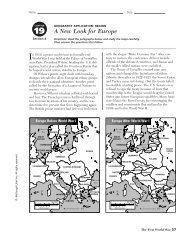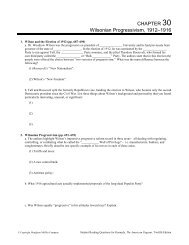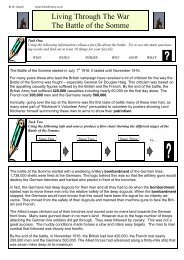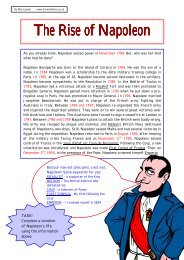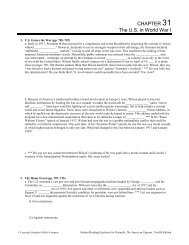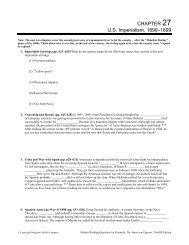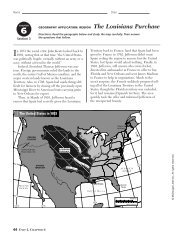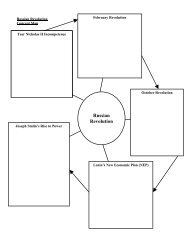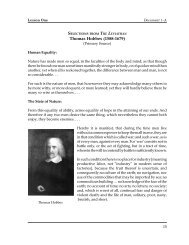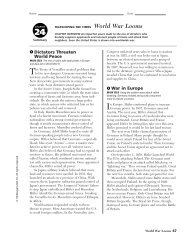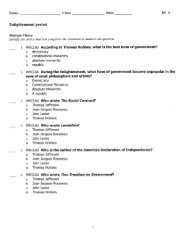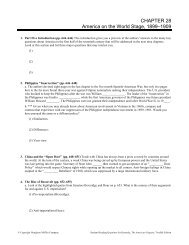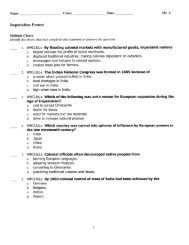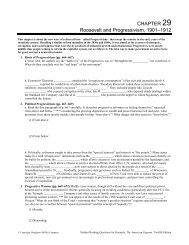You also want an ePaper? Increase the reach of your titles
YUMPU automatically turns print PDFs into web optimized ePapers that Google loves.
NameBalancing Nationalism and Sectionalism continuednorth of 36° 30’ north latitude, slavery would beillegal—except for Missouri.3The Age of JacksonMAIN IDEA Andrew Jackson’s policies spoke for thecommon people but violated Native American rights.John Quincy Adams, who became president afterMonroe, had a difficult term of office. In theelection of 1824, Andrew Jackson had won themost popular votes but lacked the electoral votesto win the presidency. The decision was thrown tothe House of Representatives. Henry Clay—whodisliked Jackson personally and politically—usedhis influence to give Adams the election.Angered, Jackson and his followers split to formtheir own party: the Democratic-Republican Party.For four years, they attacked Adams, and the countryturned toward Jackson. He also won the supportof thousands of Americans recently given the voteby more liberal election laws. Jackson won the 1828election by a wide margin.Once in office, Jackson removed about 10 percentof federal workers from office. In a moveknow as the spoils system, he replaced them withnew workers loyal to Jackson.As the demand for farmland grew, settlers againlooked on the lands of Native Americans in theSouth and West. Jackson decided to move theNative Americans elsewhere. Congress passed theIndian Removal Act in 1830. The Cherokee Nationfought back in the courts. When Chief JusticeMarshall ruled in their favor, Jackson refused tocomply. Instead, federal agents signed a treaty witha group of Cherokee leaders willing to leave. In1838, the army forced the remaining 20,000Cherokee to march west. The Cherokee called thejourney the Trail of Tears. It caused the death ofmore than a quarter of their people.4States’ Rights andthe National BankMAIN IDEA Andrew Jackson confronted two importantissues during his presidency—states’ rights and anational bank.The Tariff of 1816 (raised twice by 1828)increased the price of foreign manufacturedgoods. Although he had supported the tariff before,John C. Calhoun of South Carolina came to opposeit bitterly. Southerners felt that they were paying tobuild industry in the North. Calhoun argued thatstates could nullify—or declare void—any federallaw that they opposed. The Senate debated the tariffin 1830. A South Carolina senator blasted thetariff as a threat to the South and to states’ rights.Massachusetts senator Daniel Webster made animpassioned argument that the Union was createdby the people, not the states.Two years later, the issue came to a head.Congress passed a new tariff, and the SouthCarolina legislature declared it invalid. PresidentJackson threatened to send troops to make SouthCarolina obey the law. Clay suggested lowering thetariff over time. The compromise was accepted,and tempers cooled.Jackson faced another conflict arising from hisopposition to the Bank of the United States. Hethought the bank a threat to democracy, calling it a“monster.” He tried to shut the bank down by withdrawingthe Treasury’s money. When the bank’spresident called for all loans to be repaid, a panicresulted, and the bank lost its remaining support.In 1836, the bank’s charter expired. After the collapseof the bank, New York City became thenation’s financial capital. Jackson’s attacks on thebank angered Clay, Webster, and others, whoformed a new party: the Whigs.After two terms, Jackson retired, but his vicepresident,Martin Van Buren, won election. Heinherited a financial mess brought on by the fightover the bank. Unable to fix the country’s economy,Van Buren lost the 1840 election to Whig candidateWilliam Henry Harrison. Harrison died soon aftertaking office, however, and John Tyler succeededhim as president. Because Tyler agreed with fewWhig positions, the party could not enact its programinto law.The Jackson years had radically changed politics.Candidates had to campaign hard for officeand try to win wide popular support. The averagecitizen was more politically aware—and had morepolitical power—than ever before.Review1. How did the economies of the North, the West,and the South differ?2. How was nationalism reflected in court decisionsand diplomacy?3. How did Jackson take away the rights of NativeAmericans?4. What conflicts marked Jackson’s presidency?© McDougal Littell Inc. All rights reserved.14 Unit 2, <strong>Chapter</strong> 7 <strong>Summary</strong>



